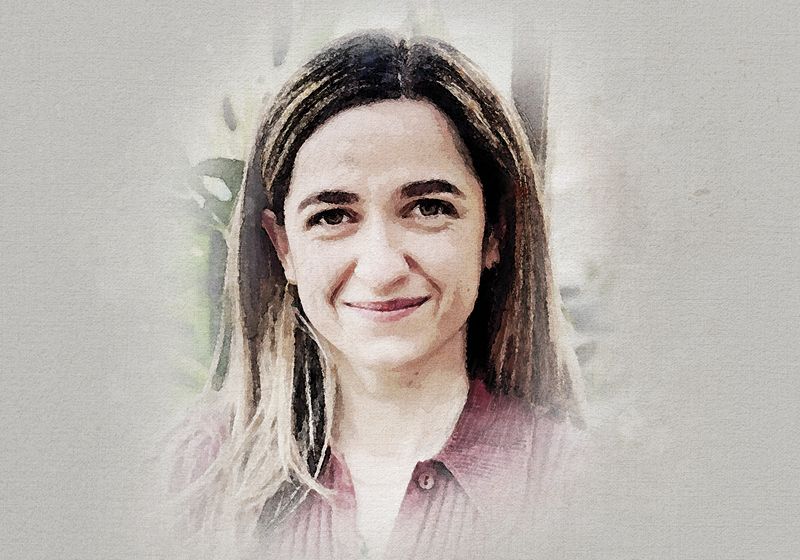A picture of Meaghan Kavanagh, a postdoc at the Harvard T.H. Chan School of Public Health.
Q | Write a brief introduction to yourself including the lab you work in and your research background.
My name is Meaghan Kavanagh, and my research focuses on the role of dietary patterns in chronic disease prevention. More simply put, my research focusses on what people eat and how that impacts their risk for diseases, specifically chronic diseases, conditions that differ from infectious diseases and include cardiovascular disease, type 2 diabetes, cancer, metabolic dysfunction–associated steatotic liver disease (MASLD), musculoskeletal diseases, and neurological disorders like Alzheimer’s disease.
I like to think of research as a spectrum: on one end are mechanistic scientists trying to figure out exactly how things work and on the other are everyday people whose lives that research aims to improve. My research moves back and forth along this spectrum, because knowledge is most valuable when translated into real-world impact.
I conduct randomized controlled trials, systematic reviews, meta-analyses, and nutritional epidemiology investigations on diet and health, as well as develop and validate patient-facing materials and and other translational tools for the general public.
Q | How did you first get interested in science and/or your field of research?
I think it’s just an intersection of many things. Growing up, I spent a lot of time in nature. I believe my parents took me canoe camping as an 8-month-old baby. Experiences like this made me curious about how things worked. I was also always interested in food, from both a creative perspective and how it related to health. Working in restaurants throughout high school exposed me to adults already struggling with diet-related health challenges.
Then I saw my parents who wouldn’t stand out in a crowd but would be considered overweight. Much of their extra weight would be considered visceral fat. Both of them have had downstream complications that could be attributed to this visceral fat. My dad has had both his knees replaced and my mom has struggled with osteoarthritis for most of her adult life in addition to other issues.
I began my undergraduate degree in biology at the University of Guelph. Then, I took a course on nutrition and metabolism in my third year, and I was hooked, I changed my major and pivoted to an undergraduate thesis in nutrition research where I got experience with human nutrition trials.
What I like so much about nutrition is that we all have to make a choice each day about what we are going to eat (i.e. everybody eats). So, diet interventions have the power to impact the health of anyone and everyone.
Q | Tell us about your favorite research project you’re working on.
Translating research evidence into practical applications is a deep- rooted passion of mine. During my PhD, I played a pivotal role in the development of the PortfolioDiet.app, an application to translate a nutrition therapy for cardiovascular disease prevention. I led the development and validation of the clinical-Portfolio Diet Score which is used by the app to allow patients to track their progress and receive personalized feedback from the app. Furthermore, I led the initial usability testing of the app, along with an acceptability study in adults at high risk of cardiovascular disease.
Now, the PortfolioDiet.app will be used in a CIHR-funded trial in high-risk adults within primary care settings (the CHEAP trial). Getting this trial going has been really interesting because it will be virtual, so we must connect with participants through digital tools. This is important as it will let the intervention be scalable and easily implemented into clinical practice. Overall, this research holds immense potential for impact as the PortfolioDiet.app is slated to be hosted on the Canadian Cardiovascular Society’s website, facilitating direct knowledge translation of the Portfolio Diet for clinicians and patients.
Q | What do you find most exciting about your research project?
I was very lucky to be invited as Guest Researcher to visit the U.S. Centers for Disease Control and Prevention (CDC) to investigate the Portfolio Diet and its cardiovascular benefits using the National Health and Nutrition Examination Survey (NHANES). I learned so much while in Atlanta. Some of the social and cultural experiences ended up informing some research decisions I had to make about the analyses I was doing. This experience at the CDC led to an abstract presentation at a major US cardiovascular conference, American Heart Association, which was probably the best conference I’ve ever been to.
Q | If you could be a laboratory instrument, which one would you be and why?
I would be a -80ºC freezer. I would be very valuable, given I hold all the biological samples from past clinical trials—which are expensive and require a lot of hard work.
Are you a researcher who would like to be featured in the “Postdoc Portraits” series? Send in your application here.

